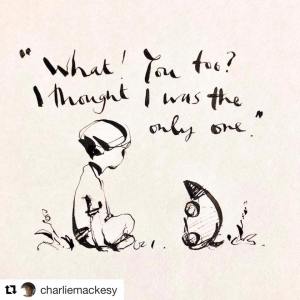Jesus told stories. That’s how He taught. Because He knew people wouldn’t remember just facts. He told stories that stuck. Parables that people had to think about; that planted seeds, took hold, and grew in hearts, minds, and souls. And when it came time to remember Jesus, it was His stories that got written down so that we might know them (and Him through them) as well.
 I love thinking about people gathering around as Jesus got rolling. You can kind of see the 12 looking at each other as He got going and thinking, “Ah, yep, the sower story again, I dig this one,” even though they’d heard it and probably still hadn’t gotten it. Jesus knew people would keep telling His stories, and His story; He counted on it. It’s why he walked the 12 through them; it’s why the Gospel writers went to so much trouble to write them down; and it’s why there are four separate Gospels, not just one condensed version. Telling the stories matters.
I love thinking about people gathering around as Jesus got rolling. You can kind of see the 12 looking at each other as He got going and thinking, “Ah, yep, the sower story again, I dig this one,” even though they’d heard it and probably still hadn’t gotten it. Jesus knew people would keep telling His stories, and His story; He counted on it. It’s why he walked the 12 through them; it’s why the Gospel writers went to so much trouble to write them down; and it’s why there are four separate Gospels, not just one condensed version. Telling the stories matters.
Stories last. None of us know Homer or Mark Twain, but we may know something about The Odyssey or Huck Finn. And likely they would rather us remember their stories than themselves. We may have never met Martin Luther King Jr., but we know his story and some of his stories. Neil Gaiman, a favorite modern day storyteller of mine, gets it:

“Stories, like people and butterflies and songbirds’ eggs and human hearts and dreams, are also fragile things, made up of nothing stronger or more lasting than 26 letters and a handful of punctuation marks. Or they are words on the air, composed of sounds and ideas–abstract, invisible, gone once they’ve been spoken–and what could be more frail than that? But some stories, small, simple ones about setting out on adventures or people doing wonders, tales of miracles and monsters, have outlasted all the people who told them, and some of them have outlasted the lands in which they were created.”
Our lives and thoughts are shaped all around by stories–our own stories, our families’ stories, and the stories we identify with. I loved being around our cousin Doug Hanks Jr. when he held court at Schooner’s Llanding, or at the Tred Avon Yacht Club, or at family parties. Even after his mother’s funeral, back at his house, telling stories of her life that had a crowd both laughing hysterically and realizing what a unique character was “Mary Hanks of Oxford.” I miss Doug’s stories and his storytelling and the way he made us all feel when he told them.

Jim Harrison is a favorite storyteller of mine. I never got to meet him, but I will be forever moved and shaped by some of his stories and poetry. He wrote that, “Death steals everything except our stories.”
I dig this story of a writer getting to know and remember him after an article:
“…we sat on your porch in Patagonia, watching you watch birds. There were hundreds of them, and you knew their names, rattling one off every now and then between long, choking drags of your American Spirits… you were gracious in the retelling of your wildest stories… you wrote from your bones, your marrow into poetry, novellas. And you made me believe that there was something to writing. That storytelling really was something romantic, magic even.”
If there is magic in stories, it is in how we remember them and how we connect to them. When we hear the stories that move us the most, it is not just because we connect with who wrote it, but because what is said speaks to us, becomes part of us. In our stories, we learn who we are; we are able to speak it and understand ourselves better. Our stories connect us, teach us, inspire us, and help define us.
What we hear in the stories that matter the most to us, is who we are.
“If a story is not about the hearer he will not listen… a great and interesting story is about everyone or it will not last.” – John Steinbeck, “East of Eden.”





































